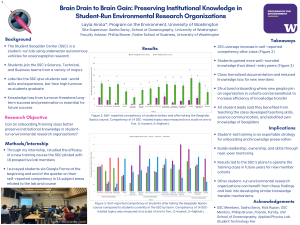From Brain Drain to Brain Gain: Preserving Institutional Knowledge in Student-Run Environmental Research Organizations
Student-run environmental research organizations allow students to gain real-world experience while conducting research that leads to a greater understanding of the environment. These programs suffer from high turnover when students graduate and take the knowledge they have acquired with them. Loss of institutional knowledge is a major issue for organizations that rely on students and mitigating this loss is essential to ensure the success and longevity of a program. This project aims to find how student-run environmental research organizations can better preserve institutional knowledge through a case study with the Student Seaglider Center: a student-run lab at the University of Washington’s School of Oceanography. For my capstone, I interned at the SSC and studied the efficacy of a new training class for students interested in joining the lab. I tracked how self-reported competency in various subject areas important to the lab like piloting, ballasting, and data analysis changed throughout the quarter. I found that from the beginning to end of the quarter, students reported an average increase of 24.89% in self-reported competency and 6.55% higher overall competency than students who were in the lab for one quarter but did not take the class. These results indicate that a course is an effective method to transfer knowledge from experienced members to newer ones which will help the SSC and other student-run research programs operate efficiently in the future and continue to do impactful environmental research.
